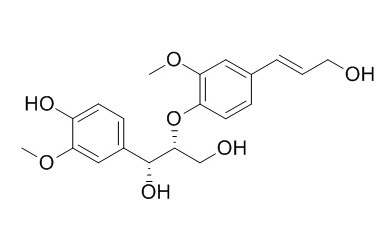threo-Guaiacylglycerol beta-coniferyl ether
Threo-Guaiacylglycerol beta-coniferyl ether displays significant inhibitory effects on NO production.
Inquire / Order:
manager@chemfaces.com
Technical Inquiries:
service@chemfaces.com
Tel:
+86-27-84237783
Fax:
+86-27-84254680
Address:
1 Building, No. 83, CheCheng Rd., Wuhan Economic and Technological Development Zone, Wuhan, Hubei 430056, PRC
Providing storage is as stated on the product vial and the vial is kept tightly sealed, the product can be stored for up to
24 months(2-8C).
Wherever possible, you should prepare and use solutions on the same day. However, if you need to make up stock solutions in advance, we recommend that you store the solution as aliquots in tightly sealed vials at -20C. Generally, these will be useable for up to two weeks. Before use, and prior to opening the vial we recommend that you allow your product to equilibrate to room temperature for at least 1 hour.
Need more advice on solubility, usage and handling? Please email to: service@chemfaces.com
The packaging of the product may have turned upside down during transportation, resulting in the natural compounds adhering to the neck or cap of the vial. take the vial out of its packaging and gently shake to let the compounds fall to the bottom of the vial. for liquid products, centrifuge at 200-500 RPM to gather the liquid at the bottom of the vial. try to avoid loss or contamination during handling.
Natural Product Communications2022, 7(3):1-7.
Mol Med Rep.2015, 12(5):7789-95
CZECH MYCOLOGY2021, 73(1):1-19.
Neurochem Int.2023, 167:105537.
Antioxidants (Basel).2022, 11(8):1471.
Front Pharmacol.2022, 13:870553.
ACS Omega.2024, 9(12):14356-14367.
Microchemical Journal2023, 194:109249
Food Research2021, 5(1):65-71
Agronomy2020, 10(10),1489
Related and Featured Products
J Ethnopharmacol. 2014 May 14;153(3):737-43.
Lignans from the stems of Clematis armandii ([Pubmed:
24661966]
The dried stems of Clematis armandii (Caulis clematidis armandii), named "Chuan-Mu-Tong" in Chinese Pharmacopoeia, have been traditionally used as an herbal remedy mainly for inflammation-associated diseases. The Aim of the study is to identify the potential anti-neuroinflammatory components from Clematis armandii.
METHODS AND RESULTS:
The ethanol extract of "Chuan-Mu-Tong" was suspended in H₂O and exhaustively extracted with CH₂Cl₂. The CH₂Cl₂ fraction was successively subjected to column chromatography (CC) over silica gel, Sephadex LH-20, and semi-preparative HPLC. The structures of the isolated compounds were identified by spectroscopic methods and by comparison with those reported in the literature. Their anti-neuroinflammatory activities were evaluated by inhibitory effects on pro-inflammatory mediators [e.g. nitric oxide (NO) and tumor necrosis factor-alpha (TNF-α)] in lipopolysaccharide (LPS)-activated BV-2 cells.
One new and sixteen known lignans were isolated and characterized. The absolute configuration of the new lignan, (7R,8S)-9-acetyl-dehydrodiconiferyl alcohol (1), was elucidated by a combination of 1D/2D NMR techniques and the Electronic Circular Dichroism (ECD) spectroscopy based on the empirical helicity rules. The anti-neuroinflammatory bioassay showed that compounds 1, (7R,8S)-dehydrodiconiferyl alcohol (2), threo-Guaiacylglycerol beta-coniferyl ether (5), and threo-guaiacylglycerol-β-coniferyl ether (6) displayed significant inhibitory effects on NO production. Among them, neolignans 1 and 2 exhibited more potent activities than the positive control (N(G)-monomethyl-L-arginine, L-NMMA), with an IC₅₀ value of 9.3 and 3.9 μM, respectively. Moreover, both 1 and 2 were also found to concentration-dependently suppress the TNF-α release in LPS-stimulated BV-2 cells.
CONCLUSIONS:
The results revealed that lignans are the major components of "Chuan-Mu-Tong", and their anti-neuroinflammatory activities strongly support the traditional application of this herb medicine on inflammation. Moreover, the dihydrobenzo[b]furan neolignans 1 and 2 as well as Caulis clematidis armandii could be further exploited as new therapeutic agents to treat inflammation-mediated neurodegenerative and aging-associated diseases.



